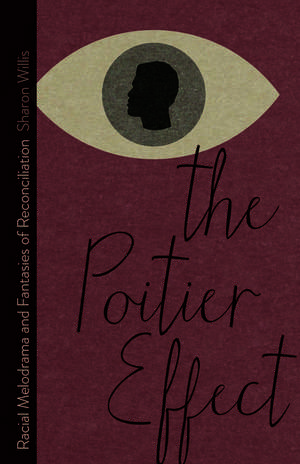The Poitier Effect: Racial Melodrama and Fantasies of Reconciliation
Autor Sharon Willisen Limba Engleză Paperback – mar 2015
The civil rights struggle was convulsing the nation, its violence broadcast into every living room. Against this fraught background, Sidney Poitier emerged as an image of dignity, discipline, and moral authority. Here was the picture-perfect black man, helping German nuns build a chapel in The Lilies of the Field and overcoming the prejudices of recalcitrant students in To Sir with Love, a redneck sheriff in In the Heat of the Night, and a prospective father-in-law in Guess Who’s Coming to Dinner. In his characters’ restrained responses to white people’s ignorance and bad behavior, Poitier represented racial reconciliation and reciprocal respect—the “Poitier effect” that Sharon Willis traces through cinema and television from the civil rights era to our own.
The Poitier effect, in Willis’s account, is a function of white wishful thinking about race relations. It represents a dream of achieving racial reconciliation and equality without any substantive change to the white world. This notion of change without change conforms smoothly with a fantasy of colorblindness, a culture in which difference makes no difference. Willis demonstrates how Poitier’s embodiment of such a fantasy figures in the popular cinema of the civil rights era—and reasserts itself in recent melodramas such as The Long Walk Home, Pleasantville, Far from Heaven, and The Help.
From change without change to change we can believe in, her book reveals how the Poitier effect, complicated by contemporary ideas about feminism, sexuality, and privilege, continues to inform our collective memory as well as our visions of a postracial society.
The Poitier effect, in Willis’s account, is a function of white wishful thinking about race relations. It represents a dream of achieving racial reconciliation and equality without any substantive change to the white world. This notion of change without change conforms smoothly with a fantasy of colorblindness, a culture in which difference makes no difference. Willis demonstrates how Poitier’s embodiment of such a fantasy figures in the popular cinema of the civil rights era—and reasserts itself in recent melodramas such as The Long Walk Home, Pleasantville, Far from Heaven, and The Help.
From change without change to change we can believe in, her book reveals how the Poitier effect, complicated by contemporary ideas about feminism, sexuality, and privilege, continues to inform our collective memory as well as our visions of a postracial society.
Preț: 114.46 lei
Preț vechi: 154.88 lei
-26% Nou
Puncte Express: 172
Preț estimativ în valută:
21.90€ • 22.91$ • 18.19£
21.90€ • 22.91$ • 18.19£
Carte indisponibilă temporar
Doresc să fiu notificat când acest titlu va fi disponibil:
Se trimite...
Preluare comenzi: 021 569.72.76
Specificații
ISBN-13: 9780816692859
ISBN-10: 0816692858
Pagini: 272
Dimensiuni: 140 x 216 x 18 mm
Greutate: 0.31 kg
Ediția:1
Editura: University of Minnesota Press
Colecția Univ Of Minnesota Press
ISBN-10: 0816692858
Pagini: 272
Dimensiuni: 140 x 216 x 18 mm
Greutate: 0.31 kg
Ediția:1
Editura: University of Minnesota Press
Colecția Univ Of Minnesota Press
Notă biografică
Sharon Willis is professor of art history and visual and cultural studies at the University of Rochester. A coeditor of Camera Obscura, she is also the author of High Contrast: Race and Gender in Contemporary Hollywood Film and Marguerite Duras: Writing on the Body, as well as many essays on contemporary cinema.
Cuprins
Contents
Preface
Introduction: Racial Pedagogy and the Magical Negro
1. Passing Through: The Obsessive Sameness of Sidney Poitier
2. Feminism as Alibi: When White Women Encounter Color
3. The Lure of Retrospectatorship: Hitting the False Notes in Far from Heaven
4. Black Authenticity and the Ambivalent Icon: Keeping It Real in Talk to Me
Conclusion: Chasing Sidney
Acknowledgments
Notes
Index
Preface
Introduction: Racial Pedagogy and the Magical Negro
1. Passing Through: The Obsessive Sameness of Sidney Poitier
2. Feminism as Alibi: When White Women Encounter Color
3. The Lure of Retrospectatorship: Hitting the False Notes in Far from Heaven
4. Black Authenticity and the Ambivalent Icon: Keeping It Real in Talk to Me
Conclusion: Chasing Sidney
Acknowledgments
Notes
Index
Recenzii
"In The Poitier Effect, Sharon Willis is an illuminating analyst of film as a visual and sonic art form and perhaps our most astute interrogator of the workings of race in American film."—Michael Awkward, University of Michigan
"Sharon Willis is one of our most trenchant—and wittiest—critics of how popular cinema casts narratives of race and gender. She unfolds a remarkably resilient script, featuring not only the actor Sidney Poitier but the Poitier effect, a mechanism of reassurance of white tolerance, of change without change."—Patricia White, author of Women’s Cinema, World Cinema
"Sharon Willis is one of our most trenchant—and wittiest—critics of how popular cinema casts narratives of race and gender. She unfolds a remarkably resilient script, featuring not only the actor Sidney Poitier but the Poitier effect, a mechanism of reassurance of white tolerance, of change without change."—Patricia White, author of Women’s Cinema, World Cinema
"Rewardingly thoughtful."—CHOICE
"The Poitier Effect, complicated by contemporary ideas about feminism, sexuality, and privilege, continues to inform our collective memory as well as our visions of postracial society."—CBQ: Communication Booknotes Quarterly
"A taut and insightful book concerning race representation in cinema."—Journal of Film and Video
"The Poitier Effect should be considered for inclusion in courses in African American cultural history, communication, feminist or cultural studies, as well as U.S. popular culture."—Journal of African American History
"The Poitier Effect, complicated by contemporary ideas about feminism, sexuality, and privilege, continues to inform our collective memory as well as our visions of postracial society."—CBQ: Communication Booknotes Quarterly
"A taut and insightful book concerning race representation in cinema."—Journal of Film and Video
"The Poitier Effect should be considered for inclusion in courses in African American cultural history, communication, feminist or cultural studies, as well as U.S. popular culture."—Journal of African American History
